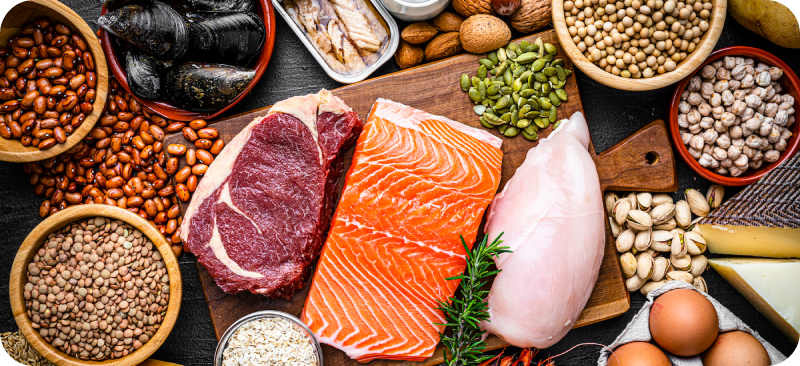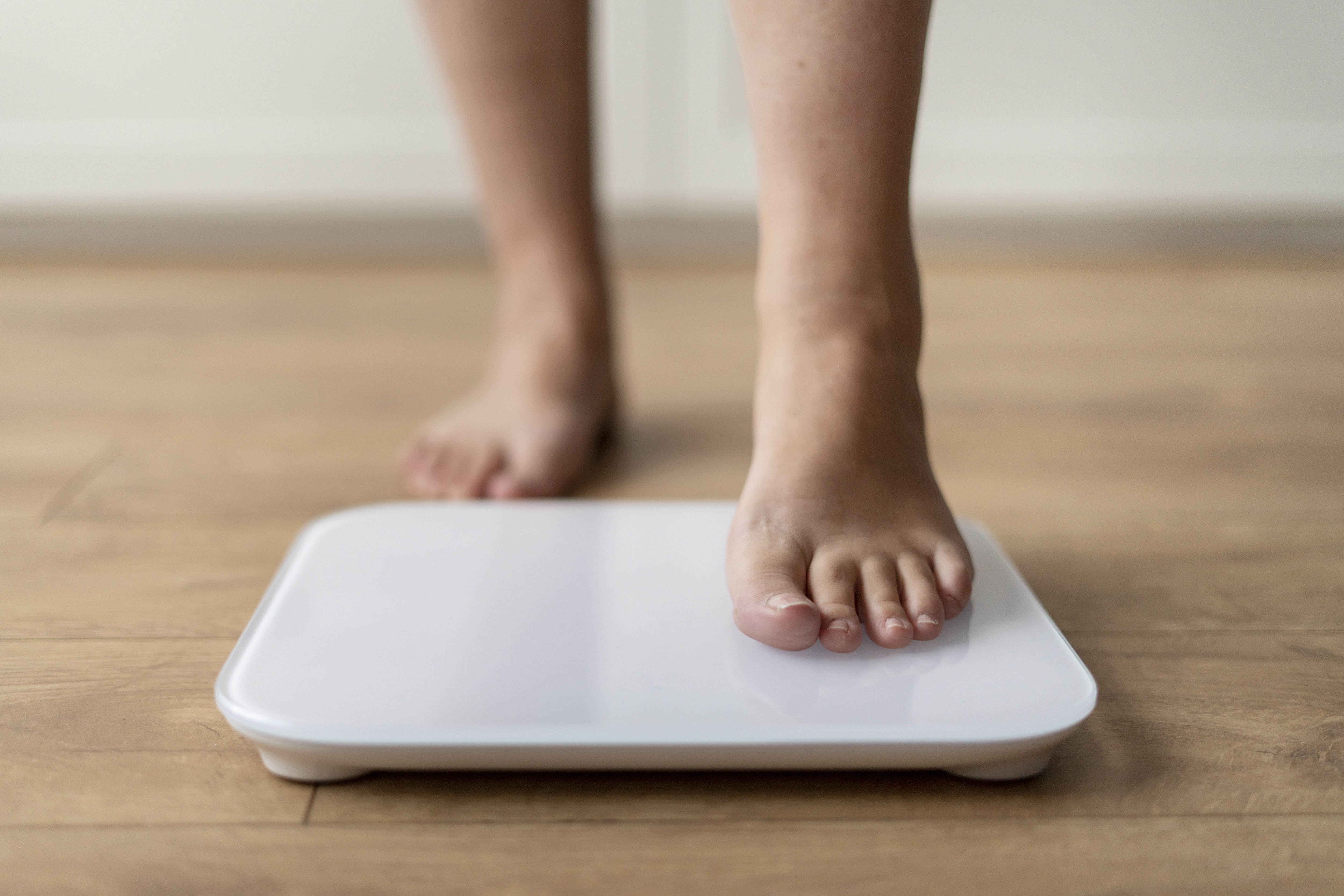With the rise in economic status, the world is getting urbanized rapidly. With urbanization, obesity has now become a worldwide health problem. A lot of comorbidities, namely cardiovascular diseases, type 2 diabetes, cancer, and osteoarthritis, are associated with obesity.
While obesity can be caused by multiple reasons, lifestyle conditions like overeating and a lack of physical activity are considered to be the major contributors.
Whenever we talk about weight loss, protein is given the highest priority among all the macronutrients. But why? Does protein really have some magical effect on our weight loss journey?
Let’s understand the importance of Protein in our diet and 6 ways how it helps in weight loss, too.
What is Protein?
Protein is a key macronutrient that our body needs. It is necessary for building and repairing tissues, producing hormones and enzymes, and maintaining a healthy immune system. However, the protein requirement varies among individuals based on multiple factors, such as age, activity level, and health conditions.
It is an important macronutrient for humans in terms of both quantity and quality. Proteins need to be consumed through our diet as they don’t have any specific storage systems in our body.
What is protein quality?
To understand the quality of protein, we need to know about its components. Protein is made up of amino acids. An amino acid is a smaller unit of protein made up of carbon,nitrogen, oxygen, and hydrogen. Out of the hundreds of amino acids found in nature, our human body needs 20 amino acids. These 20 amino acids are divided into essential and non-essential amino acids.
Essential amino acids (EAAs) are not made by our bodies themselves; hence, it is necessary to consume them from the diet. They are involved in a variety of metabolic processes. There are nine essential amino acids, and when we get all nine amino acids from a source of food, it is known as a ‘complete protein’. These amino acids are:
1.Phenylalanine
2.Valine
3.Leucine
4.Isoleucine
5.Methionine
6.Lysine
7.Histidine
8.Threonine
9.Tryptophan
The role of these amino acids are also involved in every other physiological and metabolic function, like building immunity and fighting diseases, helping in muscle building and tissue repair, improving energy levels, etc.
Sources of Protein:
Below are a few sources of protein that can be consumed to complete our daily protein needs:
protein sources: vegetarian and non-vegetarian
Complete Protein sources:
1. Lean meats: Beef, pork, lamb, and veal
2. Poultry: Chicken, turkey, goose, emu, and duck
3. Fish and sea foods: Fish, prawns, crabs, lobster, etc.
4. Eggs
5. Dairy products: Milk, yogurt, cheese, and paneer
6. Soy and whole sources of soy like tofu, tempeh, and edamame
7. Whey protein
Incomplete Protein sources:
Legumes, Nuts, Seeds, whole grains, vegetables
Some of these sources do not contain all nine amino acids and are hence termed as incomplete proteins. They can be paired with another source of protein to complete the amino acid profile. All animal-derived sources of protein are complete sources of protein.
Why do I need protein?
Protein plays many roles in the body, which include:
Building and repairing tissues: Proteins help in building tissues such as muscles, bones, skin, and organs. The body uses proteins to repair and rebuild these tissues when they are damaged.
Enzymes and hormones: Enzymes help us speed up the chemical responses in the body, while hormones act as messengers carrying signals between cells and organs. Many of these in the body are made of proteins.
Immune function: Immunoglobulins are protein antibodies used by our immune system. They identify foreign invaders and neutralize pathogenic bacteria and viruses. Proteins Keratin is considered the first line of defense, helps fight off infections and diseases, and is important for our immune function.
Transport and storage: Proteins are involved in transportation of oxygen in the blood and also act as storage molecules for storing nutrients. Inadequate consumption of protein can result in stunting, anemia, vascular dysfunction, impaired immunity and physical weakness.
How Much Protein Do You Need? (RDA for protein)
The recommended dietary allowance of protein for individuals as per National Institute of Health (NIH) guidelines is as follows:
For sedentaries or individuals with minimal activity, the RDA is 0.8–1.2 g/kg BW. For instance, if an adult weighs 60 kilograms, he needs 48 to 72 grams of protein per day.
For adults who do strength training,it is recommended to consume 1.2 to 1.8 g/kg BW. On the other hand, endurance athletes need around 1.3g/kg BW.
In the long term, minimum consumption of 1.2–2.2 g/kg BW is suggested for healthy adults and athletes.
Consumption by elderly people should be around 1–1.2 g/kg BW.
It is essential to consume high-quality protein in adequate amounts for optimal growth, development, and health in humans. However, Excessive consumption of protein may increase the risk of dehydration and result in digestive and renal abnormalities in individuals with a history of kidney disease.
6 Ways How Protein Helps in Weight Loss:
1. Protein helps modify hormone production.
Hormones provide some of the most important signals to the brain, and they change in response to feeding. Consumption of protein has been shown to reduce the production of ghrelin (hunger hormone) while boosting the appetite-reducing hormones GLP-1, peptide YY, and cholecystokinin (CCK). This automatically reduces our total calorie intake.
By increasing the consumption of protein and reducing carbs and fats from our diet, we boost several satiety hormones that help manage hunger.
2. Digesting and metabolizing protein burns calories
When we eat, calories are used for digestion and metabolism. This burning of calories in the process of digestion is known as the thermic effect of food, or TEF.
Around 20–30% of protein calories are burned for the digestion and metabolism of protein, which is comparatively higher than carbohydrates (5–10%) and fats (0–3%).
3. Protein increases “calories out.”
High protein intake can boost metabolism due to the high TEF (Thermic Effect of Food).
It burns calories around the clock, including while sleeping. A Cross-over study of three diets was conducted for 7 days on two men and six women aged 31–57 years. BMI 27.B-34.1 kg/m2: one diet with 36% energy as protein and two with 15% energy as protein, one high in carbohydrate and the other high in fat.
The 24-h EE (Energy Expenditure) and SMR (Sleeping metabolic rate) were observed to decline on all three diets, but the decrease was significantly less on the high protein diet than on the two low protein diets, which means protein intake reduces the decrease in EE while on a calorie restriction.
Higher protein intake has shown an increase in the number of calories burned. This effect is particularly seen while eating at a caloric surplus. Overfeeding with high protein consumption has been shown to burn calories by 260 per day in one study.
By burning more calories, high-protein diets increase calories burned compared to diets that are lower in protein.
4. Protein and Satiation
As discussed above, protein increases the production of satiety hormones, which automatically leads to a reduction in calorie intake.
Studies have shown that when people increase their intake of protein, they start eating fewer calories. In a study, when subjects consumed protein at 30% of calories, their total calorie intake dropped by 441 calories in a day, which is a huge difference.
5. Protein reduces Cravings
Cravings are our worst enemies. They are one of the biggest reasons why we tend to fall off our diets.
A study compared a high-protein diet with a normal-protein diet in overweight men. In this study, protein at 25% of calories reduced cravings by 60%.
Also, another study on teenage girls showed that a high-protein breakfast significantly reduced cravings.
6. Protein prevents muscle loss
Weight loss and fat loss are not the same thing and have different impacts on our bodies. When we lose weight, we tend to lose muscle mass as well, which in turn decreases our metabolic rate. As a result, we end up burning fewer calories than we did before we lost the weight.
When we eat plenty of protein, muscle loss reduces, which helps us keep our metabolic rate higher as well.
Do I need protein immediately after a workout?
Consuming protein immediately after a workout may support muscle recovery and growth. However, the timing of protein consumption isn’t as critical as it is believed to be. If we consume enough protein throughout the day to meet our daily requirements, the timing of protein intake may not have a significant impact on muscle growth and recovery.
How can I complete my daily protein requirement?
Meeting our daily protein needs can be challenging when we start paying attention to them. Below are a few ways to consider helping you complete your daily protein intake:
Whey protein powder supplement
Include protein-rich foods in meals and snacks, such as chicken, eggs, fish, dairy, legumes, nuts, and seeds.
Include protein supplements, such as whey protein or plant-based protein powder, if getting it from food sources gets difficult.
Plan your meals and snacks ahead and ensure that you include protein-rich options.
Consider getting professional help to get a personalized meal plan that meets daily protein needs.
Common Myths associated with Protein:
#Myth 1: Protein impacts our kidneys
There are no studies that have proven an association between kidneys and healthy individuals. However, a high-protein diet can have some impact on people who have a history of kidney disease.
#Myth 2: Protein increases uric acid
Patients with uric acid should limit their purine intake in the diet. But purine and protein are not the same thing. Hence, one should opt for protein sources that do not contain a lot of purines.
#Myth 3: Whey protein supplements are an unnatural source of protein
Whey is as natural as any other source of protein. It is derived from milk solids and is absolutely safe to be consumed by adults. It can be consumed even if you are not a bodybuilder or regular gymgoer. The only thing to be careful of is getting it from an authentic vendor or website.
#Myth 4: Dal is a source of protein
One of the most common misconceptions is that by consuming dal or pulses, we can meet our protein requirement. But that’s not the case. Dals are an incomplete source of protein (i.e., they lack one or more essential amino acids that our body needs to build cells) and have a major portion of carbohydrates in them.
Conclusion:
Hence, to conclude, protein is an essential macronutrient and plays a crucial role in our weight loss journey. The daily protein requirement varies as per our lifestyle, age, activity level, and goals. It is necessary to make sure we incorporate enough protein in our diet by consuming protein-rich foods and supplements that can help us with our fitness goals and optimal health.





